Please fill out the following information, and RRFC Admissions will contact you to discuss our program offerings:
Issue #136
by L. Swift and Jeff McQ
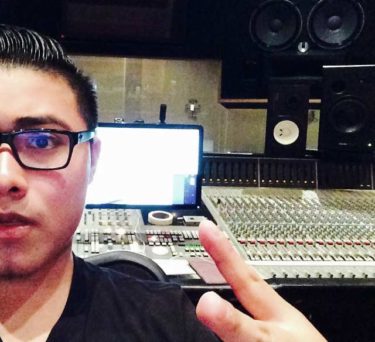 With the Recording Connection, we often say that the more you put into it, the more you get out of it. In the case of apprentice Luis Garcia, he made the decision to get everything out of the program he that he could. Before he was finished, he would find himself learning one-on-one from Grammy-winning music producer Rahki (Eminem, Kendrick Lamar) through the Recording Connection’s prestigious Learn from Legends program.
Luis’ interest in producing, engineering and making beats started at an early age, to the point that he was already scoping out audio schools by age 15.
“At first I was looking into reaching other audio schools before I even graduated,” he says, so I was considering The Art Institute, Full Sail University. They were all great schools. I got accepted, but the problem was financial: they were just too expensive for me.”
After graduating, Luis spent a brief amount of time at Santa Monica College. “I was unhappy with what I was doing just because I knew I wasn’t in the right place,” he says. “So I just continued doing research. The next thing you know I see the Recording Connection.”
When Luis discovered he could learn in a real recording studio for a fraction of what it costs to attend most colleges, he decided to jump in with both feet. After completing the basic course at Serenity West in Los Angeles under mentor Steve Catizone, he went on to do the master’s program with Doug Boulware at The Abstract Recording Studios. But Luis still wanted to take things to the next level, so he decided to apply for the Recording Connection’s premiere Learn from Legends program, a select course in which the student trains with a known, credentialed, award-winning producer after an extensive interview. Specifically, Luis asked if he could interview with Rahki.
“I wanted Rahki just because I felt like we identify more as far as music tastes,” says Luis. “He’s Kendrick Lamar’s producer, Eminem, and stuff. So I was like, that’s definitely my type of guy.”
Brian Kraft, Recording Connection’s consultant, set up the interview. When Luis arrived at Rahki’s private studio in Burbank, he was understandably nervous, but that soon changed. “He made me feel super welcome and super comfortable,” he says. “That’s one thing I liked about Rahki, is that a guy of his profile, you would think that he could be intimidating, but to me he was super, super nice.”
It didn’t take long to get an answer back. “The next day, Brian called me, like, ‘Congratulations, you’ve got approved by a Grammy-award winning producer!’” says Luis. “Now I’m with Rahki and everything is just working out amazing right now.”
Luis says he drew upon his prior training with the bachelor’s and master’s programs when going into sessions with his new mentor. “Rahki is a real busy guy where he brought in the artist that he was working [with],” he says. “I just had to lay back…because he told me, ‘Keep proper studio etiquette.’ So I applied what my past mentors had told me about how to behave in a session when you’re with artists. So I was just in the back of the room with my notebook just taking notes, staying quiet and just observing and reserving all the questions for the end, once the session was done… [It] helped me a lot just because, I mean, as an aspiring producer, working…engaging with an artist or with an engineer or songwriter, it’s really important just because you’ve got to have a specific vibe in the room, and you’ve got to know how to properly work and get around the session the right way …You’ve got to maintain a certain level of professionalism.”
During their lesson times, Luis says Rahki has definitely helped him up his game as a producer. “When I was with Rahki, I learned that when you’re making a track, you’re not just making a track. You’re making a song,” says Luis. “There’s a difference between a beat maker and a producer. A beat maker would be somebody who just makes beats that sound good. But a producer actually takes it to the other level and actually leaves spaces, leaves room for the artist to sing…Rahki helped me properly structure a song depending on what kind of genre I was going into.”
With the Recording Connection, we often say that the more you put into it, the more you get out of it. In the case of apprentice Luis Garcia, he made the decision to get everything out of the program he that he could. Before he was finished, he would find himself learning one-on-one from Grammy-winning music producer Rahki (Eminem, Kendrick Lamar) through the Recording Connection’s prestigious Learn from Legends program.
Luis’ interest in producing, engineering and making beats started at an early age, to the point that he was already scoping out audio schools by age 15.
“At first I was looking into reaching other audio schools before I even graduated,” he says, so I was considering The Art Institute, Full Sail University. They were all great schools. I got accepted, but the problem was financial: they were just too expensive for me.”
After graduating, Luis spent a brief amount of time at Santa Monica College. “I was unhappy with what I was doing just because I knew I wasn’t in the right place,” he says. “So I just continued doing research. The next thing you know I see the Recording Connection.”
When Luis discovered he could learn in a real recording studio for a fraction of what it costs to attend most colleges, he decided to jump in with both feet. After completing the basic course at Serenity West in Los Angeles under mentor Steve Catizone, he went on to do the master’s program with Doug Boulware at The Abstract Recording Studios. But Luis still wanted to take things to the next level, so he decided to apply for the Recording Connection’s premiere Learn from Legends program, a select course in which the student trains with a known, credentialed, award-winning producer after an extensive interview. Specifically, Luis asked if he could interview with Rahki.
“I wanted Rahki just because I felt like we identify more as far as music tastes,” says Luis. “He’s Kendrick Lamar’s producer, Eminem, and stuff. So I was like, that’s definitely my type of guy.”
Brian Kraft, Recording Connection’s consultant, set up the interview. When Luis arrived at Rahki’s private studio in Burbank, he was understandably nervous, but that soon changed. “He made me feel super welcome and super comfortable,” he says. “That’s one thing I liked about Rahki, is that a guy of his profile, you would think that he could be intimidating, but to me he was super, super nice.”
It didn’t take long to get an answer back. “The next day, Brian called me, like, ‘Congratulations, you’ve got approved by a Grammy-award winning producer!’” says Luis. “Now I’m with Rahki and everything is just working out amazing right now.”
Luis says he drew upon his prior training with the bachelor’s and master’s programs when going into sessions with his new mentor. “Rahki is a real busy guy where he brought in the artist that he was working [with],” he says. “I just had to lay back…because he told me, ‘Keep proper studio etiquette.’ So I applied what my past mentors had told me about how to behave in a session when you’re with artists. So I was just in the back of the room with my notebook just taking notes, staying quiet and just observing and reserving all the questions for the end, once the session was done… [It] helped me a lot just because, I mean, as an aspiring producer, working…engaging with an artist or with an engineer or songwriter, it’s really important just because you’ve got to have a specific vibe in the room, and you’ve got to know how to properly work and get around the session the right way …You’ve got to maintain a certain level of professionalism.”
During their lesson times, Luis says Rahki has definitely helped him up his game as a producer. “When I was with Rahki, I learned that when you’re making a track, you’re not just making a track. You’re making a song,” says Luis. “There’s a difference between a beat maker and a producer. A beat maker would be somebody who just makes beats that sound good. But a producer actually takes it to the other level and actually leaves spaces, leaves room for the artist to sing…Rahki helped me properly structure a song depending on what kind of genre I was going into.”
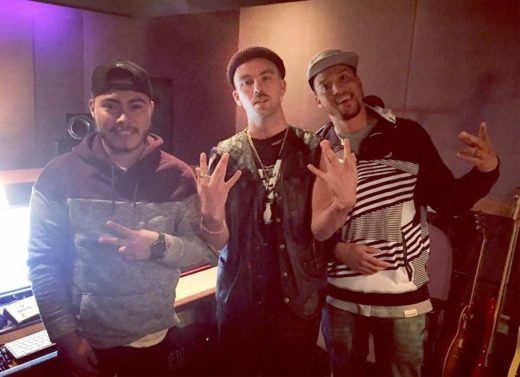
RC Grad Luis Garcia (left) with artist SonReal and mentor Rahki (right)
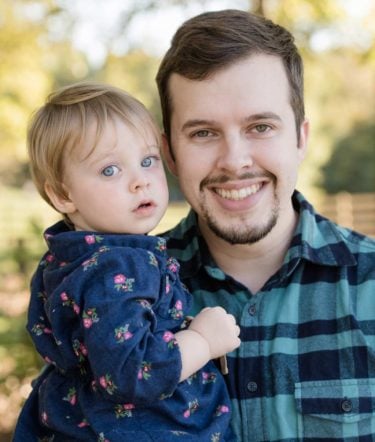
Peter Scheibner and daughter Kaleigh Joy Scheibner.
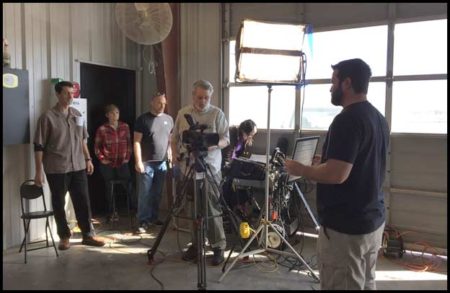 Film Connection student Gibran Trujillo-Pelcastre (Myrtle Beach, South Carolina), who apprentices at Encore Video, is diving into the deep end of production! “On my first week of working with my mentor, I [got] to see and study the projects his company had worked on, and I also got introduced to the basic principles of everything, I got some hands on experience doing some lighting, editing some video footage, and learning the steps of producing a show or movie. I am currently working on how to come up with estimates for projects and movies.”
Film Connection student Gibran Trujillo-Pelcastre (Myrtle Beach, South Carolina), who apprentices at Encore Video, is diving into the deep end of production! “On my first week of working with my mentor, I [got] to see and study the projects his company had worked on, and I also got introduced to the basic principles of everything, I got some hands on experience doing some lighting, editing some video footage, and learning the steps of producing a show or movie. I am currently working on how to come up with estimates for projects and movies.”
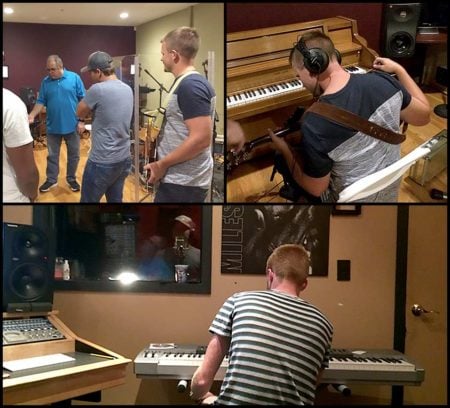 Recording Connection apprentice Jesse Ludwig, who apprentices with Joey Heier at Crystal Clear Studio (Phildelphia, PA) recently brought a band into the studio and received real, firsthand feedback from his mentor. “Joey talked with me for an hour about how the session went the previous week with the band I brought in. We talked about what needed some work and what sounded incredible! He let me loose on his Pro Tools and the mixer he had for about an hour, figuring things out by myself and with my own ear. It was awesome! I put some reverb behind the band’s voice…I then put some Auto-Tune behind the voice…I then learned to just set the whole band the right way and make the mix sound good. I then used the program called Melodyne and tried playing around with it…Joey came in from the other room where he was with another student, but heard me mixing, and said he was impressed with what I knew already. All in all, it was a great day!”
Recording Connection apprentice Jesse Ludwig, who apprentices with Joey Heier at Crystal Clear Studio (Phildelphia, PA) recently brought a band into the studio and received real, firsthand feedback from his mentor. “Joey talked with me for an hour about how the session went the previous week with the band I brought in. We talked about what needed some work and what sounded incredible! He let me loose on his Pro Tools and the mixer he had for about an hour, figuring things out by myself and with my own ear. It was awesome! I put some reverb behind the band’s voice…I then put some Auto-Tune behind the voice…I then learned to just set the whole band the right way and make the mix sound good. I then used the program called Melodyne and tried playing around with it…Joey came in from the other room where he was with another student, but heard me mixing, and said he was impressed with what I knew already. All in all, it was a great day!”

RRFC is education upgraded for the 21st century.
Get the latest career advice, insider production tips, and more!
Please fill out the following information, and RRFC Admissions will contact you to discuss our program offerings:
Stay in the Loop: Subscribe for RRFC news & updates!
© 2025 Recording Radio Film Connection & CASA Schools. All Rights Reserved.


